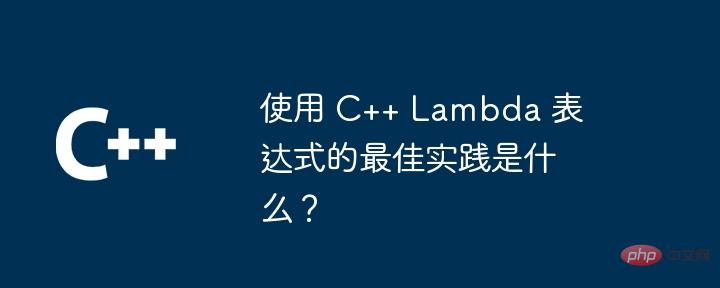Home >Backend Development >C++ >What are the best practices for using C++ lambda expressions?
What are the best practices for using C++ lambda expressions?
- WBOYWBOYWBOYWBOYWBOYWBOYWBOYWBOYWBOYWBOYWBOYWBOYWBOriginal
- 2024-06-05 13:01:58598browse
C++ Lambda expression best practices: keep it short and focused, avoid data copies, capture carefully, consider inlining, and use type inference. By following these rules, you can write maintainable and efficient lambda expressions.

Best Practices for C++ Lambda Expressions
Introduction
Lambda Expressions Formats were introduced in C++11 and allow developers to define anonymous functions that are short and easy to read. Following best practices is critical to ensuring the maintainability and performance of your code. This article explores best practices for using C++ lambda expressions.
Rule 1: Short and Focused
Lambda expressions should be kept short and focused on a single task. Longer lambda expressions can be difficult to understand and maintain.
Rule 2: Avoid copying data
Passing large data structures to lambda expressions can reduce performance. Instead, consider creating a reference or pointer to the data.
Rule 3: Be careful with captures
Using [=] or [&] to capture a list will result in a copy of all variables. If the lambda expression needs to modify a local variable, use [&] to capture the variable.
Rule 4: Consider inlining
If the Lambda expression is short and will not be called multiple times, you may consider inlining to improve performance.
Rule 5: Use type inference
C++14 introduced type inference, which allows you to infer the type of a lambda expression from its body. This helps avoid unnecessary type conversions.
Practical Case
Consider the following example where we want to sort a list of integers using a Lambda expression:
#include <vector>
#include <algorithm>
int main() {
std::vector<int> numbers = {1, 3, 2, 4, 5};
// 将 lambda 表达式作为比较函数传递给 sort
std::sort(numbers.begin(), numbers.end(), [](int a, int b) { return a < b; });
// 打印已排序的列表
for (const int& number : numbers) {
std::cout << number << " ";
}
return 0;
}In this example, the Lambda expression The formula implements a comparison function for sorting lists. It adheres to best practices:
- Keep it short and focused on the comparison task.
- Explicit type conversion is avoided by using type inference.
Conclusion
By following these best practices, you can write maintainable and efficient C++ lambda expressions. By being short and focused, avoiding copying data, and being careful with captures and inlining, you can improve the readability and performance of your code.
The above is the detailed content of What are the best practices for using C++ lambda expressions?. For more information, please follow other related articles on the PHP Chinese website!

